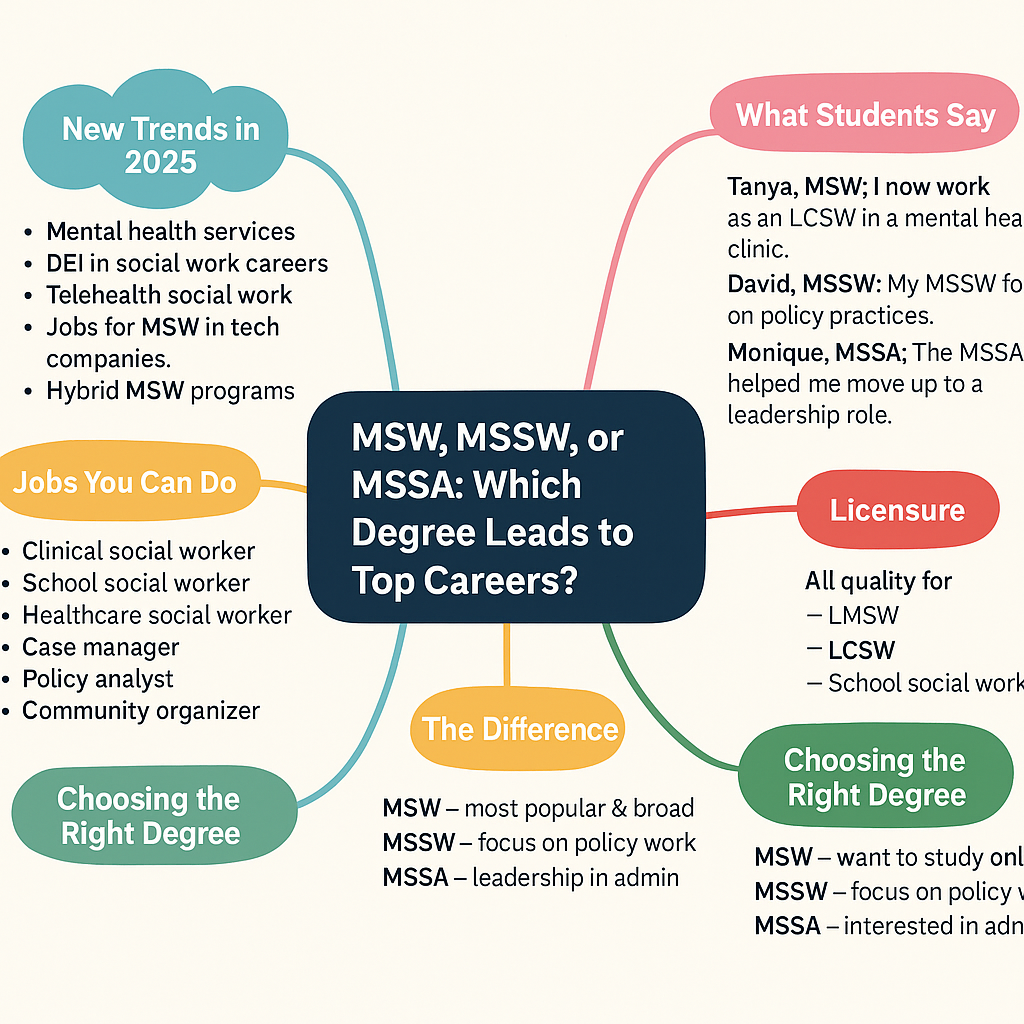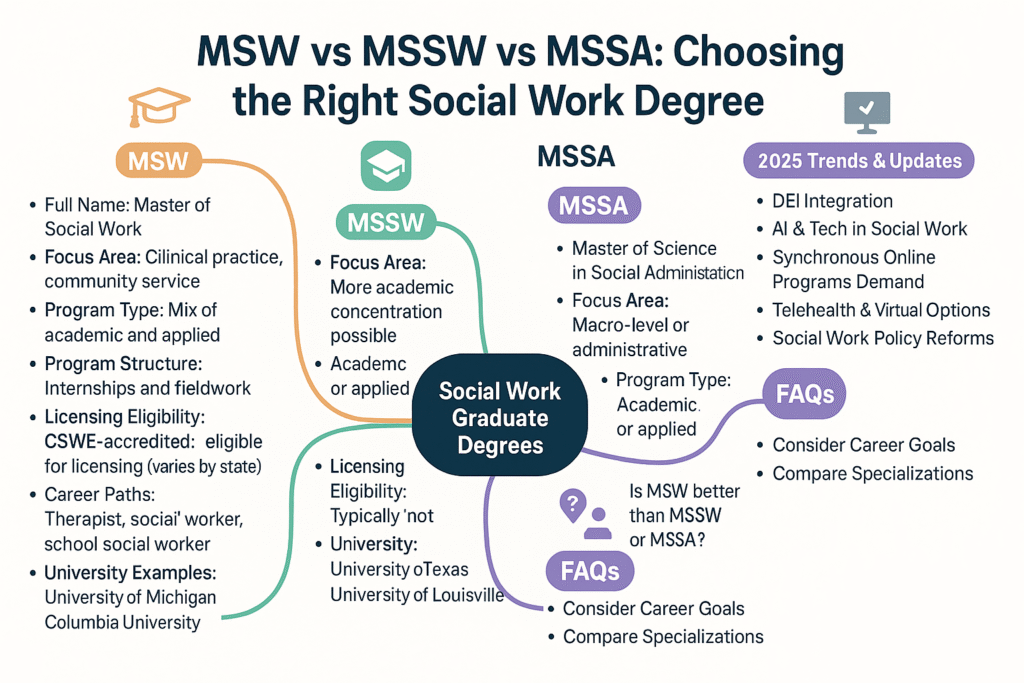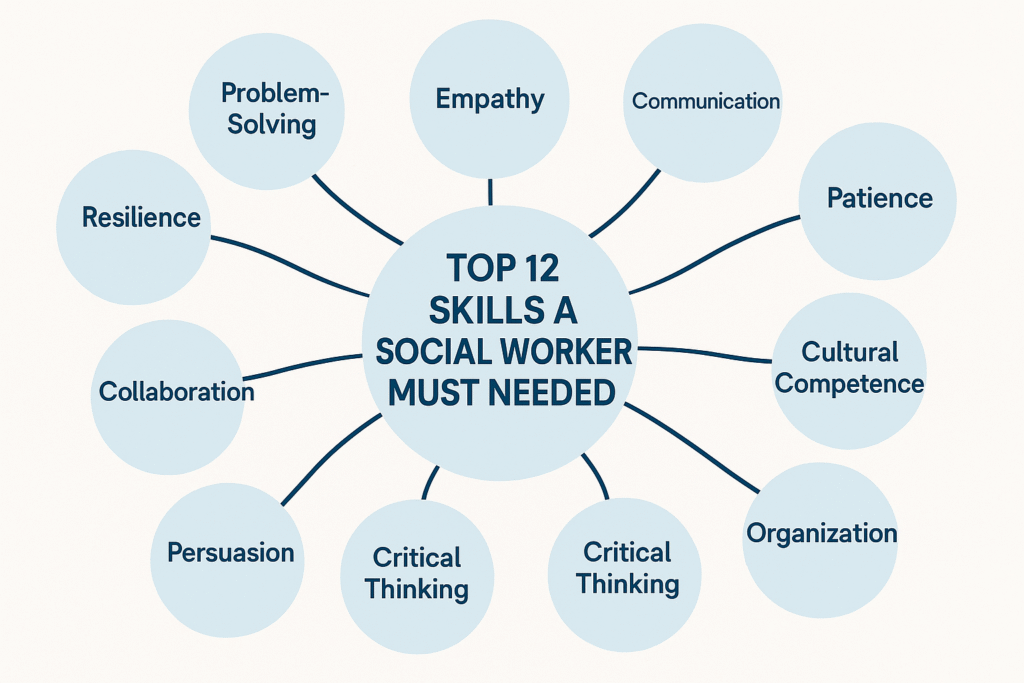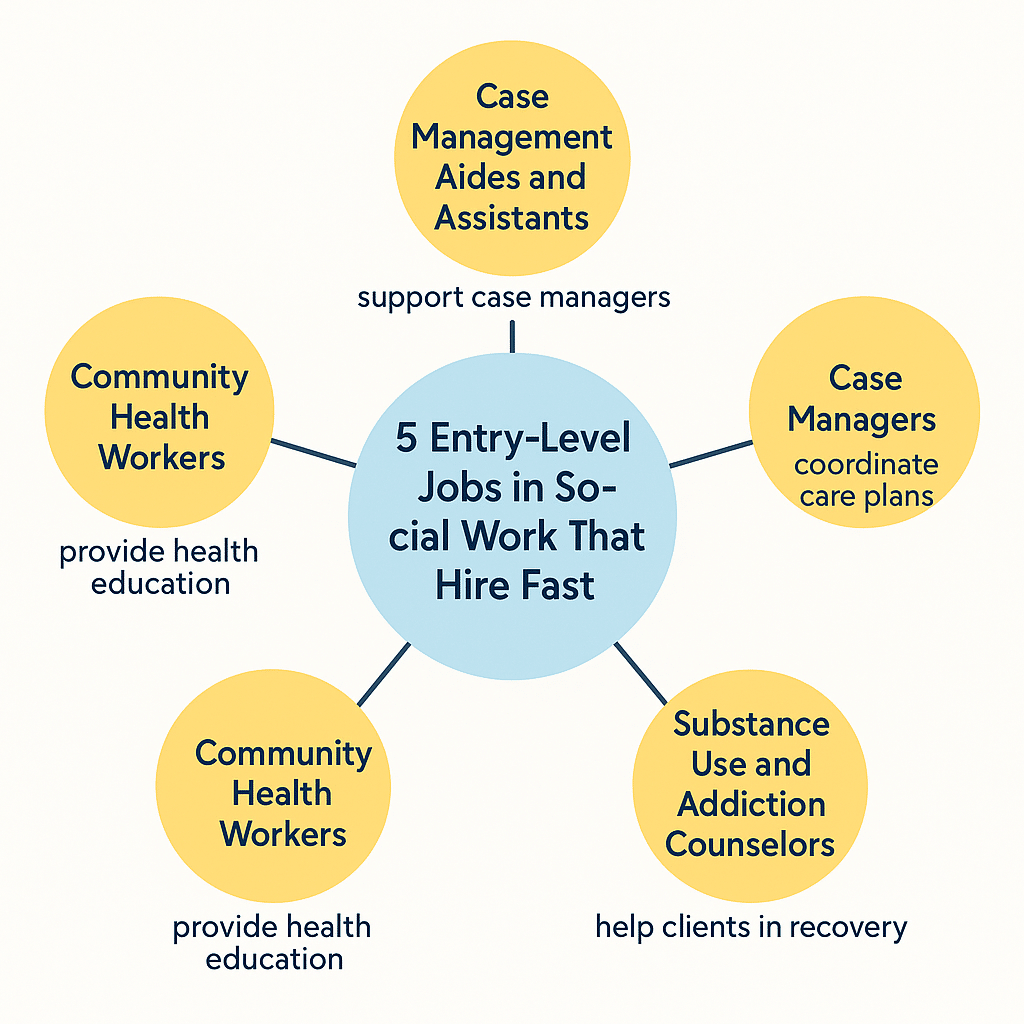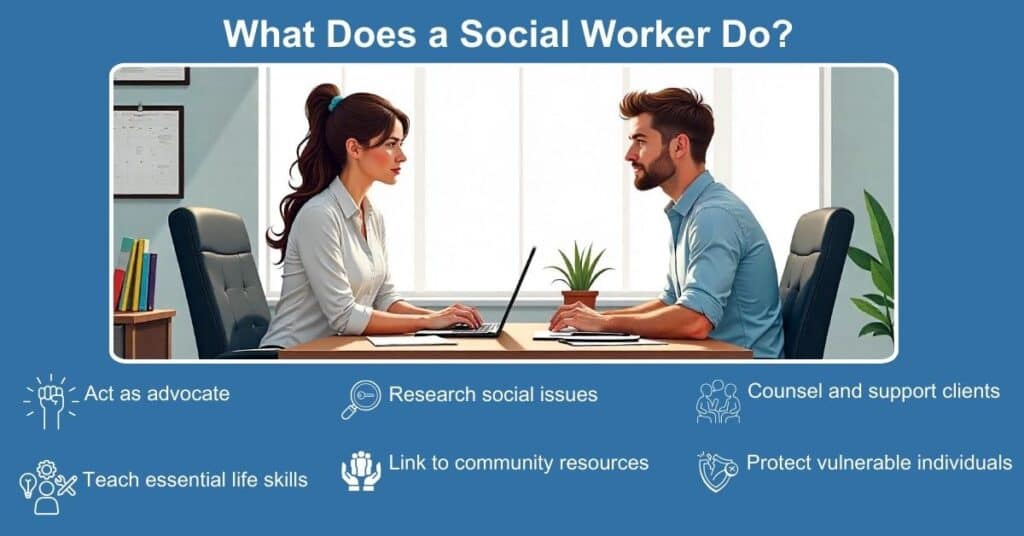
How To Become Social Worker ? Quick Guide to Success
If you’re someone who is passionate about making a tangible difference in people’s lives, then social work may be the perfect career for you. As a social worker, you’ll have the opportunity to change lives, empower individuals, and advocate for communities. Whether you’re just exploring the field or are ready to take the first step! A Social Worker is a trained professional Who Helps and improve the well-being of Vulnerable People. They provide support, resources, and guidance to those facing issues such as poverty, abuse, addiction, mental health challenges, family conflicts, or social injustices.
Social workers often advocate for their clients and work to create positive changes in society by addressing systemic issues. They may be employed in various settings, including schools, hospitals, government agencies, non-profit organizations, or private practices.
At a Glance
Social workers empower individuals and communities by connecting them with resources, fostering stability, and promoting mental wellness. With advanced training, many specialize in areas such as mental health, family support, and public health, making a meaningful impact in people’s lives.
To get started, look into degree programs in social work that suit your goals. Many colleges and universities offer Bachelor of Social Work (BSW) and Master of Social Work (MSW) programs. For those balancing work, family, or other responsibilities, online social work programs provide the flexibility to study at your own pace.
Featured Programs for Aspiring Social Workers
To get started, look into degree programs in social work that suit your goals. Many colleges and universities offer Bachelor of Social Work (BSW) and Master of Social Work (MSW) programs. For those balancing work, family, or other responsibilities, online social work programs provide the flexibility to study at your own pace.
- Top Jobs After MSW, MSSW, or MSSA: Find Your Best Career Path
- MSW vs MSSW vs MSSA: Which Social Work Degree Is Right for You?
- 12 Social Work Skills You Can’t Ignore in 2025
- 2025’s Cheapest online MSW Programs in California – Online & On-Campus Guide
- 5 Social Work Jobs That Hire Fast With No Experience
- Explore Social Work Field Placements: Settings & Real Examples
The Powerful Role of Social Workers
Social workers are truly the backbone of society. By addressing a range of issues from mental health and family stability to community resources and social justice, social workers have the power to change lives for the better. They provide the vital support that people need to overcome life’s most difficult challenges.
What is Social Work?
At its core, social work is about supporting individuals, families, and communities to help them improve their well-being. Social workers offer counseling, access to resources, and advocacy to help others lead better, healthier lives. This profession spans multiple fields including mental health, child welfare, family support, and community outreach.
Example: A social worker in a healthcare setting may help a patient navigate the complex healthcare system and ensure they have the resources they need to stay well.
What Do Social Workers Do?
The roles and responsibilities of a social worker vary based on their specialty. Some examples include:
- Clinical Social Workers: Provide therapy and counseling for individuals and families facing mental health issues or life crises.
- School Social Workers: Help students overcome academic or emotional challenges, working closely with parents, teachers, and administrators.
- Healthcare Social Workers: Guide patients through medical processes, offering emotional support and resource connections.
Who Do Social Workers Serve?
Social workers work with a diverse range of individuals, from children and elderly adults to those dealing with substance abuse, mental health issues, and disabilities. Their work is essential to ensuring people can live happy, healthy, and fulfilling lives.
Example: A school social worker might assist a young student facing bullying by helping them build coping strategies and addressing the underlying issues with the family and school.
5 Steps to Become a Social Worker
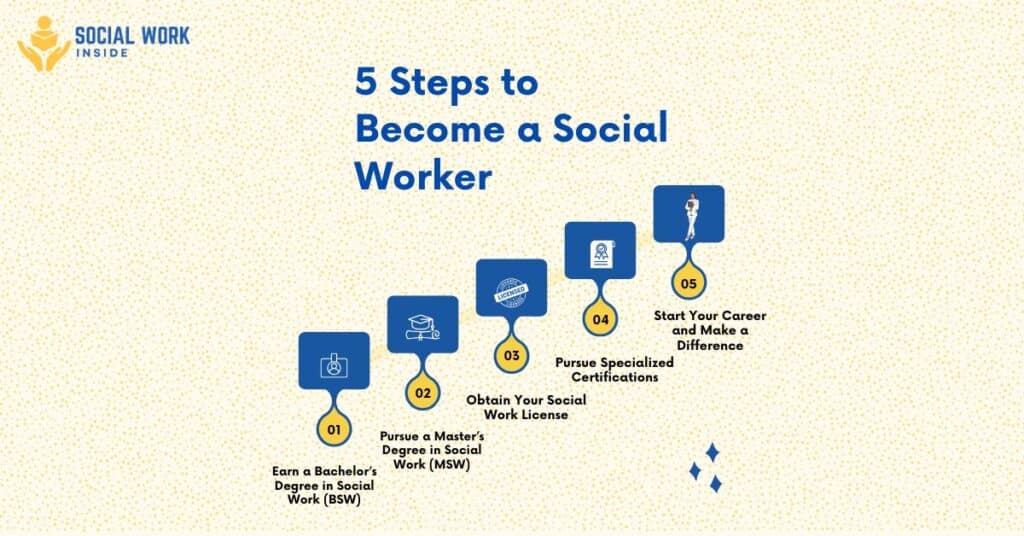
Are you ready to begin your journey toward becoming a social worker? These essential steps will guide you as you move forward with confidence and excitement:
Social Work Degree Levels
1. Earn a Bachelor’s Degree in Social Work (BSW)
Starting with a BSW opens the door to numerous entry-level positions in the social work field. You’ll learn valuable skills in case management, ethics, and counseling that will serve as the foundation for your future success.
2. Pursue a Master’s Degree in Social Work (MSW)
For advanced positions, consider pursuing a Master’s in Social Work (MSW). This degree offers deeper knowledge in areas like clinical practice, social justice, and mental health counseling. It’s an investment that enhances your expertise and opens the door to leadership roles.
3.Obtain Your Social Work License
In most places, you’ll need a license to practice as a social worker. After completing your degree, the next step is to pass a licensure exam and meet any state-specific requirements. It’s an important milestone in your career that marks your readiness to work independently.
4. Pursue Specialized Certifications
As you continue your career, consider pursuing specialized certifications such as trauma-informed care or addiction counseling. These certifications allow you to expand your skill set and better serve those in need.
5. Start Your Career and Make a Difference
Once you’ve completed your education and licensing, it’s time to dive into your social work career. Whether you’re working in a hospital, school, or community setting, your work will be impactful, fulfilling, and essential to the well-being of others.
Career Paths for Social Workers
There are many exciting career paths within the social work field, each offering different ways to make a difference:
- Clinical Social Workers: Provide therapy and counseling to individuals with mental health challenges.
- Child Welfare Social Workers: Support families in crisis to protect the well-being of children.
- School Social Workers: Work in schools to ensure that students have the resources and emotional support they need to succeed.
- Healthcare Social Workers: Provide vital assistance to patients as they navigate complex healthcare systems.
Social Work Salaries
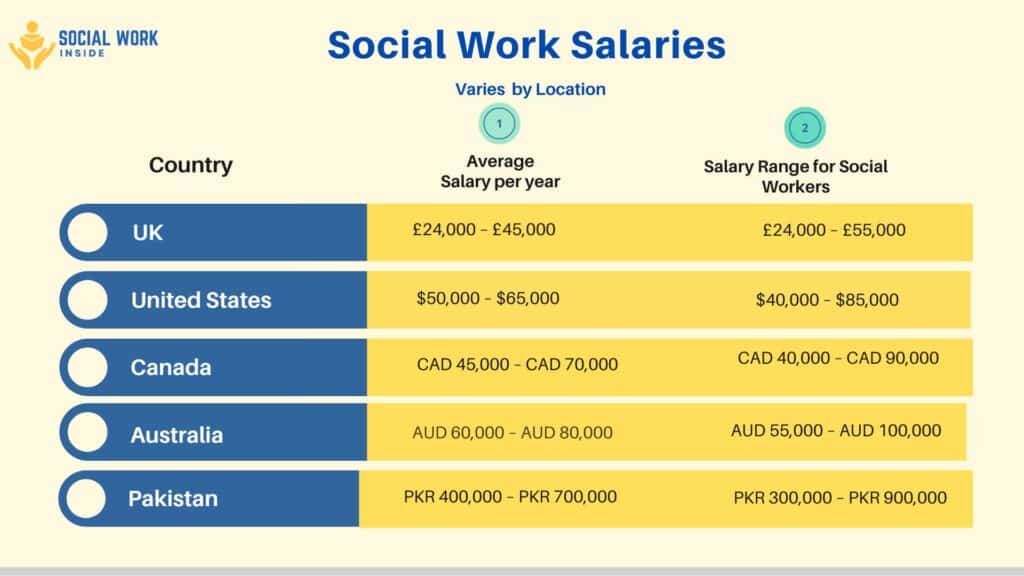
The salary for a social worker can vary based on the specialty and location, but on average, a social worker can expect to earn anywhere from $50,000 to $65,000 per year. Clinical social workers and those in healthcare often earn higher salaries. The field offers long-term job stability, with a growing demand for professionals in areas like mental health and child welfare. (BLS:2023)
Navigating State Licensure for Social Workers
Each state has its own licensure requirements. In most cases, you’ll need to complete a degree program, gain supervised experience, and pass a licensure exam. Be sure to research your state’s specific requirements to ensure a smooth licensure process.
FAQs
What I Wish I Knew Before Becoming a Social Worker?
Starting a career in social work is a fulfilling journey, but there are a few things you might wish you knew:
- Emotional Resilience Is Key: Social work can be emotionally taxing, and learning how to manage your own emotional well-being is crucial.
- Self-Care is Essential: Protecting your mental health is vital to sustaining a long, successful career in social work.
- Constant Learning: The field evolves, and staying updated with training and certifications will enhance your practice.
- Challenging but Rewarding: Working within complex systems can be tough, but the rewards of helping others make it all worth it.
Becoming a social worker is a powerful and impactful career choice. Through compassion, advocacy, and support, social workers change lives every day. By following these positive steps, you’ll be on your way to a fulfilling career where you’ll have the chance to create meaningful change and build a better world for everyone you encounter.

